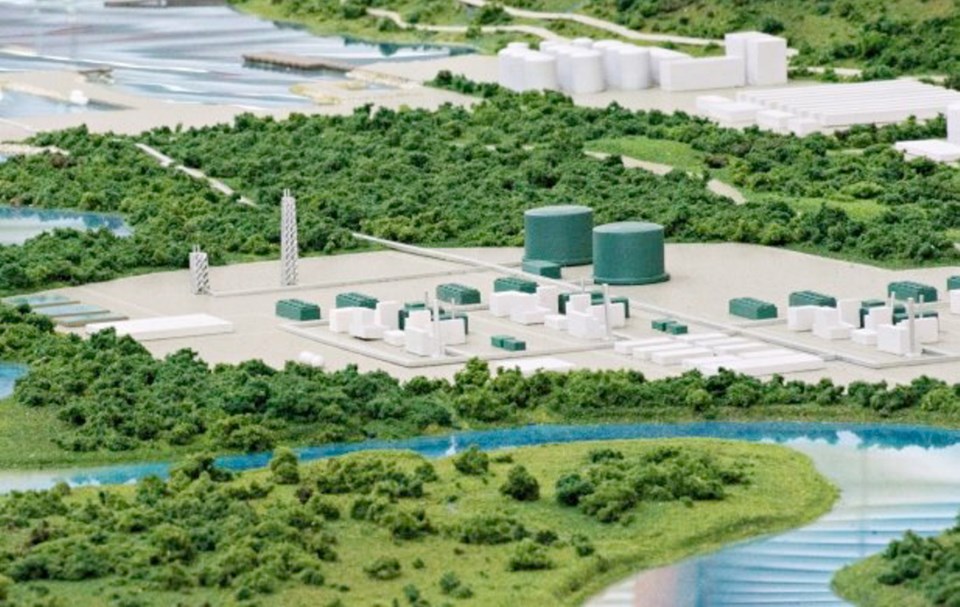 It’s not as big a deal as it appears at first glance, but some pipeline news Tuesday suggests the rebirth of the LNG dream is still underway. No one has delivered yet, but it’s in active labour.
It’s not as big a deal as it appears at first glance, but some pipeline news Tuesday suggests the rebirth of the LNG dream is still underway. No one has delivered yet, but it’s in active labour.
The Coastal GasLink pipeline project is “conditionally awarding” $620 million in contract work to northern B.C. Indigenous businesses, with another $400 million possibly available.
The condition is whether the big proposed LNG Canada plant near Kitimat at the end of the proposed pipeline gets built. That’s a big enough “subject to” to make the announcement virtually meaningless. It simply confirms the original idea — if the project ever proceeds, the proponents would commit to hiring First Nations people. They’re already doing that, in any event. Preparatory work has been underway since 2012, and about a third of it has been completed by First Nations workers.
But still. Considering the LNG dream was presumed more or less dead soon after the NDP took power, it’s worth noting that the concept is far from down and out.
Seven days after the NDP cabinet was sworn in, the other front-running proponent, Petronas, bailed out. It blamed the market, but the change of government didn’t go unnoticed at the corporation’s Malaysian headquarters, as the NDP had actively opposed its project.
The LNG Canada consortium was next in line. Over the course of its year in office, the NDP has become as enthusiastic about the multibillion-dollar proposal as the B.C. Liberals were.
According to the , all that’s needed for that potential billion-dollar boom in the Indigenous business world is for LNG Canada to make a final investment decision on the plant.
Reaffirming plans to hire Indigenous companies at this point suggests local officials are assuming it’s a go. But that’s been their default position all along. The years of preparation are scheduled to wrap up at the end of this month. The actual final investment decision will be made this year by the four energy giants backing the venture (Shell, PetroChina, Korea Gas and Mitsubishi).
The NDP policy of elevating the importance of First Nations’ rights dovetails with the LNG Canada project, because it has widespread and deep Indigenous support. The company says it has signed project agreements with 95 per cent of First Nations communities along the 670-kilometre route from Dawson Creek to Kitimat. LNG Canada has been working with them since 2012 to build relationships. No fewer than 10 chiefs endorsed Tuesday’s announcement.
A First Nations LNG Alliance has also been active in promoting the project and preparing to reap benefits from it. The CEO of that group, Karen Ogen-Toews, said Tuesday there is optimism about a green light for the project: “Things are in motion.”
The group is working to finalize benefits and turn the promised jobs into careers by backing apprenticeship training. Similarly, conditional contracts have already been awarded for construction of the line. The ones announced Tuesday are for clearing, gravel processing, and road and camp preparation.
Ogen-Toews said the amount of that work awarded to First Nations is unprecedented in B.C. for a pipeline.
For all the enthusiasm and optimism, though, the consortium has already balked once. It was nearing a final investment decision in 2016 when it postponed the call, citing market conditions. The company has been trying to trim costs from the project since then.
It got major help on that front in March, when Premier John Horgan reversed his earlier criticism of B.C. Liberal “handouts” to the industry and granted even more. LNG proponents got promised relief from the sales and carbon taxes and cheaper electricity. Plus the LNG income tax will be abolished if they commit.
The one wild card yet to be played in the endgame leading to a final investment decision is held by Green Party Leader Andrew Weaver. He rejects LNG completely because it increases provincial greenhouse-gas emissions when the government is committed to reducing them. Greens would never support bills to grant the tax breaks to the industry, which would be introduced if the company commits to the project.
That wouldn’t bring the government down, because the B.C. Liberals would likely support the tax breaks. The question is whether Weaver would void the confidence agreement over such measures, throwing everything up in the air.



